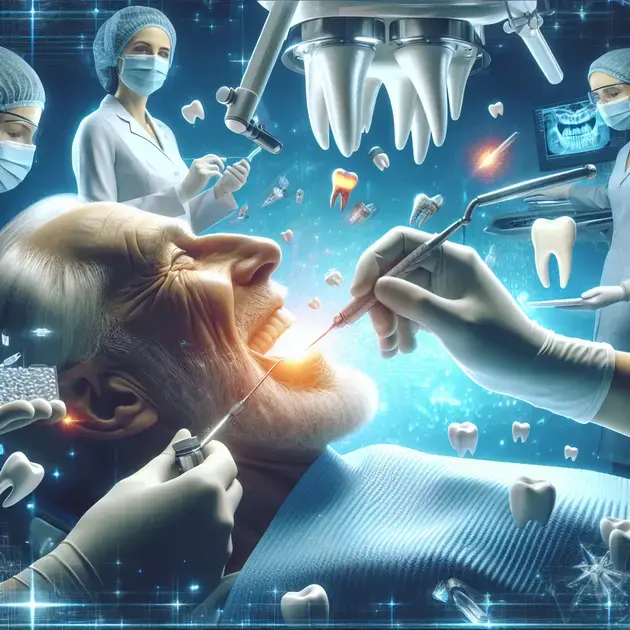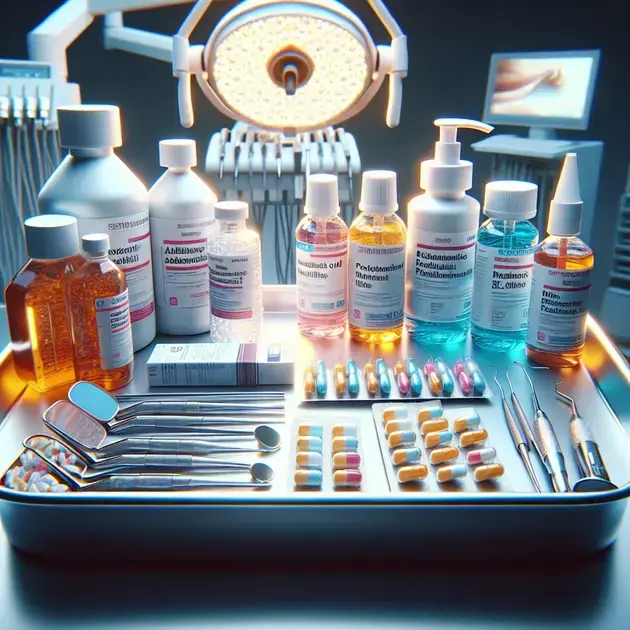Today, finding effective medication for periodontitis is crucial for maintaining good oral health. Periodontitis, a serious gum infection that damages the soft tissue and destroys the bone supporting the teeth, affects a large percentage of the population worldwide. In this comprehensive guide, we will explore the latest treatments and medications available to combat this condition.
With advancements in dental research and technology, healthcare professionals now have a variety of treatment options to offer patients suffering from periodontitis. From traditional approaches such as scaling and root planing to innovative medications like antibiotics and antimicrobial mouth rinses, this guide will delve into the most effective strategies for managing and treating periodontal disease.

Understanding Periodontitis: Causes and Symptoms Explained
Periodontitis is a serious gum infection that damages the soft tissue and destroys the bone that supports your teeth. The main cause of periodontitis is the buildup of plaque, a sticky film of bacteria that forms on teeth. Lack of proper oral hygiene, smoking, genetics, and certain medical conditions can also contribute to the development of periodontitis.
To understand if you might have periodontitis, look out for symptoms such as swollen or receding gums, persistent bad breath, loose teeth, and pain while chewing. If you suspect you have periodontitis, it’s important to seek professional dental care for an accurate diagnosis and treatment plan.
Steps to Understand Periodontitis Causes and Symptoms:
- Visit the American Dental Association (ADA) website for detailed information on periodontitis causes and symptoms.
- Schedule an appointment with a periodontist to undergo a comprehensive dental examination.
- Discuss your oral health habits and medical history with the dental professional to determine potential risk factors.
- Undergo diagnostic tests such as X-rays and periodontal probing to assess the severity of the condition.
- Work with your periodontist to create a personalized treatment plan to address the causes and symptoms of periodontitis.
Exploring Traditional Treatments: Scaling and Root Planing
Scaling and root planing are common non-surgical procedures used to treat gum disease, including periodontitis. Scaling involves removing plaque and tartar from the tooth surfaces and below the gumline, while root planing smoothens the root surfaces to promote gum reattachment and healing.
These treatments are usually performed by a dental hygienist or periodontist using specialized instruments to clean the teeth and roots thoroughly. Scaling and root planing help reduce gum inflammation, prevent further progression of gum disease, and promote overall oral health.
Steps to Explore Scaling and Root Planing Treatments:
- Consult your dentist to determine if scaling and root planing are suitable treatments for your gum disease.
- Ask for recommendations on experienced periodontists or dental hygienists who specialize in gum disease treatments.
- Schedule an appointment for a thorough evaluation and discuss the procedure details with the oral healthcare provider.
- Prepare for the treatment by following any pre-procedural instructions provided by the dental professional.
- Attend follow-up appointments to monitor the progress of healing and maintain optimal oral hygiene practices.
Innovative Medications: Antibiotics and Antimicrobial Mouth Rinses
Antibiotics and antimicrobial mouth rinses are effective tools in combating gum infections like periodontitis. Antibiotics can be prescribed by your dentist or periodontist to target and eliminate the bacteria causing the infection, while antimicrobial mouth rinses help reduce plaque and gingivitis.
These medications can be used as part of a comprehensive treatment plan to control gum disease and prevent its recurrence. It’s essential to follow the prescribed dosage and application instructions to maximize the benefits of these innovative medications.
Steps to Utilize Antibiotics and Antimicrobial Mouth Rinses:
- Consult with your dental provider to determine if antibiotics or antimicrobial mouth rinses are appropriate for your periodontitis treatment.
- Obtain a prescription for the medications and clarify any questions regarding usage and potential side effects.
- Incorporate the antibiotics or mouth rinses into your daily oral hygiene routine as directed by the oral healthcare professional.
- Maintain regular dental check-ups to monitor the effectiveness of the medications and adjust the treatment plan if needed.
- Adhere to good oral hygiene practices, including brushing, flossing, and using mouthwash, to support the action of antibiotics and antimicrobial rinses.

Understanding the Role of Antibiotics in Periodontitis Treatment
When it comes to treating periodontitis, antibiotics play a crucial role in combating the bacterial infection that causes gum disease. These medications are often prescribed by dentists to help control the growth of harmful bacteria in the mouth and reduce inflammation in the gums. Antibiotics can be taken orally or applied directly to the affected areas, depending on the severity of the condition.
One of the key benefits of using antibiotics in periodontitis treatment is their ability to reach deep into the gum pockets where bacteria can hide and multiply. By targeting these bacteria, antibiotics can help prevent further damage to the gums and bone structure supporting the teeth. However, antibiotics are typically used in combination with other dental treatments, such as scaling and root planing, to ensure comprehensive care.
It’s important to follow your dentist’s instructions when taking antibiotics for periodontitis. It’s essential to complete the full course of medication as prescribed, even if your symptoms improve before the treatment is finished. Skipping doses or stopping the medication prematurely can lead to antibiotic resistance, making future infections harder to treat.
While antibiotics can be effective in treating periodontitis, they are not a standalone solution. Good oral hygiene practices, such as regular brushing, flossing, and dental check-ups, are essential for maintaining gum health and preventing the recurrence of gum disease. Your dentist can provide personalized recommendations on how to incorporate antibiotics into your periodontitis treatment plan.
Overall, antibiotics play a vital role in the comprehensive treatment of periodontitis, working alongside other dental interventions to target and eliminate harmful bacteria in the gums. By following your dentist’s advice and maintaining good oral hygiene habits, you can support the effectiveness of antibiotic therapy and promote long-term gum health.
Incorporating Antimicrobial Mouth Rinses into Your Oral Hygiene Routine
Antimicrobial mouth rinses are a valuable addition to your oral hygiene routine, helping to reduce the levels of harmful bacteria in the mouth and promote gum health. These specialized mouthwashes contain ingredients that target and kill bacteria, offering an extra layer of protection against gum disease when used regularly.
When selecting an antimicrobial mouth rinse, look for products that are specifically formulated to combat gingivitis and periodontitis. These mouthwashes often contain active ingredients like chlorhexidine or essential oils that have been proven effective in reducing plaque buildup and preventing gum inflammation.
To incorporate an antimicrobial mouth rinse into your oral hygiene routine, start by choosing a time of day when you can use the mouthwash consistently, such as after brushing your teeth in the morning or before bed. Measure the recommended amount of mouthwash according to the product instructions and swish it around your mouth for the recommended duration.
It’s important not to swallow antimicrobial mouth rinse, as these products are designed for external use only. After rinsing, avoid eating or drinking for at least 30 minutes to allow the active ingredients to have maximum efficacy. With regular use, antimicrobial mouth rinses can help maintain a healthy balance of oral bacteria and support gum health.
In addition to using an antimicrobial mouth rinse, remember that good oral hygiene practices, including proper brushing and flossing techniques, are essential for overall oral health. Consult with your dentist or dental hygienist for personalized recommendations on incorporating antimicrobial mouth rinses into your oral hygiene routine.
Exploring Localized Medication Options for Severe Periodontitis
For individuals with severe periodontitis, localized medication options can provide targeted treatment to address deep gum pockets and persistent bacterial infections. These specialized medications are typically administered directly to the affected areas in combination with scaling and root planing procedures to optimize therapeutic outcomes.
One common localized medication option for severe periodontitis is the use of antibiotic gels or chips placed in the gum pockets after deep cleaning. These products slowly release antibiotics over time, effectively targeting bacteria and promoting healing in difficult-to-reach areas. Your dentist will determine the most appropriate type of localized medication based on the severity of your condition.
Localized antimicrobial therapy can significantly enhance the effectiveness of traditional periodontal treatments, reducing inflammation, preventing further bone loss, and promoting gum tissue regeneration. These targeted approaches help to address the root cause of severe periodontitis and support long-term gum health.
It’s essential to follow your dentist’s post-treatment instructions after receiving localized medication for severe periodontitis. This may include avoiding certain foods, practicing gentle oral hygiene, and attending follow-up appointments to monitor your progress. By adhering to your dentist’s recommendations, you can maximize the benefits of localized medication and optimize your periodontal treatment outcomes.
Discuss with your dental provider about the suitability of localized medication options for your severe periodontitis and explore how these targeted therapies can complement your overall treatment plan. With the right combination of localized medication, traditional periodontal treatments, and good oral hygiene practices, you can work towards improving the health of your gums and preserving your smile.
Conclusion
Antibiotics are essential in treating periodontitis by targeting harmful bacteria that cause gum disease. They reach deep into gum pockets to prevent further damage and work best alongside other dental treatments like scaling and root planing. Following your dentist’s instructions is crucial to avoid antibiotic resistance and ensure comprehensive care.
Antimicrobial mouth rinses are valuable for reducing harmful bacteria levels and promoting gum health. Look for products formulated to combat gingivitis and periodontitis, containing active ingredients like chlorhexidine. Incorporate mouth rinses into your routine at consistent times, ensuring not to swallow the product for maximum efficacy.
Localized medication options provide targeted treatment for severe periodontitis, addressing deep gum pockets and bacterial infections. These therapies enhance traditional treatments, reducing inflammation, preventing bone loss, and promoting gum tissue regeneration. Follow post-treatment instructions to optimize outcomes and discuss with your dental provider for personalized recommendations.



